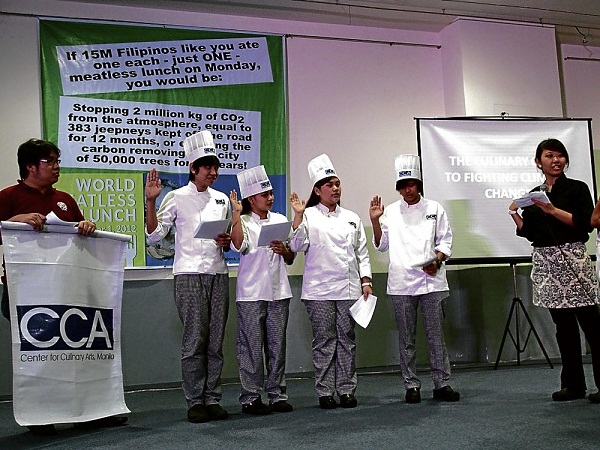
OATH TO CLIMATE CHANGE Vegan chef Marie Itchon Gonzalez with students of Center for Culinary Arts. Photo by Tessa R. Salazar
The World Meatless Lunch, a recently formed Filipino-led movement composed of scientists, nutritionists and environment advocates, revealed to members of media on Oct. 1 the emergent need for all individuals on this planet to start reducing their own carbon footprints to avoid climatic catastrophe by 2050.
During the first World Meatless Lunch at the Events Hall of CWC Home Depot in Makati City, the movement’s organizers cited the pronouncement of the International Energy Agency that excess manmade greenhouse gas emissions (GHGs) need to be stabilized by 2017. Otherwise, the agency said, humanity would be headed for irreversible global warming, leading to increases in global temperatures by as much as 4 degrees Celsius in 2050.
World Meatless Lunch pinpointed global livestock populations (pork, beef, poultry, etc.) and their processing as the primary contributor to GHGs, and called on the public to reduce their consumption of animal-based food products.
Participants of the World Meatless Lunch’s program to provide alternatives to meat included culinary arts students from the Center for Culinary Arts who the “oath to fight climate change,” declaring themselves “climate warriors” whose “expertise in food handling and creation may affect the health of individuals and of the planet.
Developing sustainable foods
Led by vegan chef Marie Itchon Gonzalez, the future chefs swore to invest in developing advanced sustainable foods that will balance issues on health and nutrition, culture, socioeconomics, food security and environment; use culinary talents to develop, popularize and make profitable dishes that aim to seek better alternatives to meat; promote the culture of eco-friendliness by minimizing water and kitchen waste and by using recyclable and biodegradable materials.
World Meatless Lunch founder Custer Deocaris, a Department of Science and Technology balik scientist, stressed that the (culinary) sector would be “critical in changing the landscape of dietary choices to one that is predominantly plant-based and compassionate.”
Deocaris said that as of August 2012, the atmospheric concentration of carbon dioxide has reached 395 parts per million (ppm), already exceeding the threshold of 350 ppm for humanity to avoid climate catastrophe.
Responsible
According to recent analysis, the lifecycle and supply chain of livestock products is actually responsible for at least 51 percent of all anthropogenic greenhouse gas emissions (GHGs). Deocaris said the food and climate connection may not be obvious to many, but just think of the amount of energy and fossil fuels it takes to raise and slaughter the approximately 65 billion land animals in 2011 alone.
Forty-five percent of all earth’s land area is now being used for livestock and feed production instead of growing trees to absorb excess greenhouse gases, and instead of growing food to feed the hungry. Twenty percent of pastures are already degraded through overgrazing and erosion.
“With all these data, we now know why our food choices are more likely to reverse climate change than any of the other ‘green’ choices, such as renewable energy, fuel-efficient cars, green architecture, combined,” Deocaris said.
He added that this is the key recommendation from the world environment experts: If we can replace at least a quarter of today’s livestock products with better alternatives which would both reduce emissions and allow forests to regenerate on a vast amount of land, this collective move could stabilize global GHGs to a safer level.
Climate warriors
Filipino vegetarian restaurant owners who attended the event and declared themselves “climate warriors” included Oscar Anne-Varona (Leveriza, Manila); Greens (Scout Castor, Quezon City); Blissful Belly (Xavierville, Quezon City); Pipino Vegan Restaurant (Teachers’ Village, Quezon City), Wabi Sabi (Malugay, Makati) and Nanay Nona’s Catering.
“Climate warrior” chefs are encouraged to send their meat-free, planet-friendly recipes to tsalazarph@yahoo.com.

